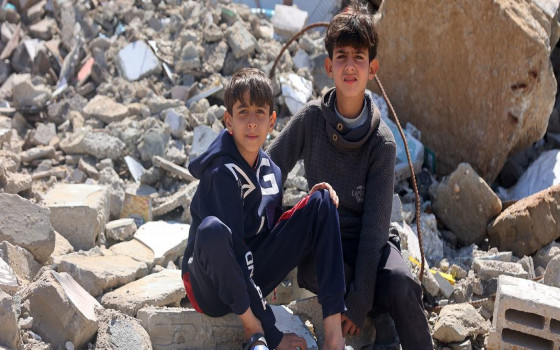
UNICEF: More than a million children in Gaza have been deprived of life-saving aid for more than a month

- Europe and Arabs
- Sunday , 6 April 2025 9:28 AM GMT
Gaza - New York: Europe and the Arabs
The United Nations Children's Fund (UNICEF) said that the ban on humanitarian aid is having dire consequences for one million children in the Gaza Strip.
In a statement issued on Saturday, the organization recalled that no aid has been allowed into the Strip since March 2, 2025—the longest period of aid blockage since the war began—resulting in shortages of food, clean water, shelter, and medical supplies. It warned that without these essentials, rates of malnutrition, disease, and other preventable conditions are likely to rise, leading to an increase in preventable child deaths. According to the UN daily news bulletin, Edouard Beigbeder, UNICEF Regional Director for the Middle East and North Africa, said the organization has thousands of pallets of aid waiting to enter the Gaza Strip.
He added: "Most of this aid is life-saving, but instead of saving lives, it is being stockpiled. It must be allowed in immediately. This is not a choice or a charity; it is an obligation under international law." Life-threatening malnutrition
UNICEF warned that children receiving malnutrition treatment are at grave risk. Twenty-one treatment centers—15 percent of all outpatient facilities—have been closed since March 18, 2025, due to displacement orders or shelling. Some 350 children relying on these centers now face worsening malnutrition, potentially threatening their lives.
The organization said that complementary infant foods, essential for growth when food stocks are low, have run out in central and southern Gaza, leaving only enough ready-to-use infant formula for 400 children for a month.
UNICEF estimates that nearly 10,000 infants under six months of age require complementary feeding. Without ready-to-use infant formula, families may be forced to use alternatives mixed with unsafe water. She noted that, in addition to nutrition services, UNICEF has been forced to reduce mental health and psychosocial support services, mine risk education, and child protection case management due to ongoing hostilities and mass displacement.
Impact of Fuel Depletion and Water Shortages
UNICEF noted that during the ceasefire, it began repairing vital wells and water points to increase the availability of safe drinking water. However, with the collapse of the ceasefire, many remain unrepaired or are at risk of further damage.
UNICEF said that access to drinking water for one million people, including 400,000 children, has fallen from 16 liters per person per day to just six liters.
UNICEF warned that if fuel runs out in the coming weeks, this rate could drop to less than four liters, forcing families to use unsafe water and increasing the risk of disease outbreaks, especially among children. "For the sake of more than one million children in the Gaza Strip, we urge the Israeli authorities to ensure that at least the basic needs of the population are met, in line with their obligations under international humanitarian law. This includes their legal responsibility to ensure that families are provided with the food, medicine, and other essential supplies they need to survive," said UNICEF Regional Director for the Middle East and North Africa.
The organization said that despite the extremely difficult situation, it and its partners are maintaining a vital presence. It called on the parties to cease hostilities and resume the ceasefire, adding that humanitarian aid and commercial goods must be allowed to enter and move freely across the Gaza Strip.












No Comments Found